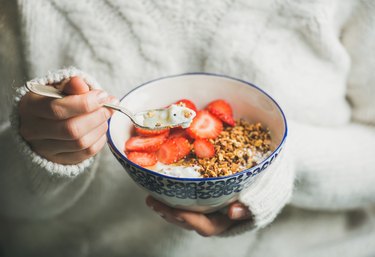
When it comes to weight loss, we as a society typically hone in on one specific nutrient, blame it for all of our weight woes, cut it from our diet and then watch as our weight fluctuates down and up, down and up.
Low-fat diets were all the rage for awhile, and now it appears that carbs are public enemy No. 1. But are there really specific foods to avoid for weight loss?
Video of the Day
Video of the Day
Time and time again, research has shown us that it's healthy eating patterns like the Mediterranean diet that are better for our weight and overall, long-term health than any fad diet.
And when we look at some of these diets — Mediterranean diet, DASH diet, flexitarian diet — what's one thing they have in common? Yes, they include healthy fats and carbohydrates — but they're also low in ultra-processed foods.
These science-backed lifestyle diets call for eating mainly whole foods, including fruits, vegetables, low-fat dairy, legumes, fish, some lean meat, whole grains and nuts and seeds; not sugary beverages, potato chips and cookies, or even "healthier" versions of ultra-processed foods, like diet cola and "lean" frozen dinners.
The trouble? Currently, 71 percent of our food and beverage supply is considered ultra-processed, as outlined in a study published July 2019 in Nutrients.
So what kind of effect can that have on our weight and overall health? The research to date shows that consistently eating these ultra-processed foods isn't doing our waistlines any favors.
Processed Foods and Weight Gain
When it comes to foods to avoid for weight loss, a growing body of research points to processed foods.
A review published in the December 2019 issue of Current Treatment Options in Gastroenterology looked at the research on this topic done to date and found a strong link between the growing popularity of ultra-processed foods and the obesity epidemic in the U.S.
Processed foods, the authors concluded, contribute to decreased satiety, increased meal eating rates, more weight gain and a higher risk of disease. Still, since this review is observational, it only indicates a strong association, not a cause-and-effect relationship.
The latter is something researchers set out to determine in a clinical study published May 2019 in Cell Metabolism. They broke a group of 20 into two groups: an ultra-processed group and an unprocessed group. For two weeks, each group was allowed to eat as much or as little as they wanted at each meal. Meals were matched for calories, macronutrients and sodium. When the two weeks were up, the researchers switched the groups and the experiment was run again for another two weeks.
The results were pretty staggering: Researchers found that people ate about 500 more calories each day when they were on the ultra-processed diet. They also gained about a pound of body fat; but the opposite was seen on the unprocessed diet. On that diet, people tended to lose about a pound over the two weeks.
Ready to Lose Weight?
Set yourself up for success with more from our 30-Day Weight-Loss Kickstart.
So, What Is Processed Food, Exactly?
The truth is, most foods we eat, even the healthiest, are technically processed. Dairy? Processed. Oats? Processed. Almonds? Processed. These foods have to undergo some type of processing between the harvest and your table in order to be safe and palatable enough to eat.
Unhealthy processed foods are the ones that are overly processed, i.e. "ultra-processed." Tufts University uses this handy definition: Ultra-processed foods are foods that undergo industrial processes (e.g. salting, sugaring, frying and curing) that extend shelf life, make food extremely palatable and make food that is designed to be ready-to-consume.
Typically, ultra-processed foods barely resemble their original state, or they were developed in a lab. They typically have a laundry list of ingredients, including added colors, and they're typically void of any real nutritional value and might be high in sodium, saturated fat and/or sugar.
So, when it comes to foods to avoid for weight loss, your list should start with things like chips, fries, candy, chicken nuggets, hot dogs and soft drinks — that's a no-brainer. But there are other processed options on the list that may surprise you, since we tend to think of them as healthy.
4 Healthy, Less-Processed Swaps

The old guidelines for healthy eating were to shop the perimeter at the grocery store, and while that's still good advice, keep in mind that there are plenty of healthy foods that can be found within the aisles as well. Here are some healthier, less-processed food swaps.
Instead of: Light yogurt
Consider: Plain yogurt
While many people might think they're picking the healthier, low-calorie option with light yogurt, it typically includes artificial sweeteners and artificial flavors. Instead, look for a plain, low-fat yogurt and add slices of real fruit for sweetness.
Instead of: Diet soda
Consider: Sparkling water
Again, diet soda might seem like the better, low-calorie pick, but it's an ultra-processed food and in most cases includes artificial sweeteners and flavors. Instead, try sparkling water and add your own fruit, or opt for an unsweetened seltzer with some flavor essence.
Instead of: White bread
Consider: Whole-grain bread
With white bread, the wheat grain has been stripped of the bran and germ that holds all of the fiber, B vitamins and some minerals. White breads are enriched to add back some of those missing nutrients, but not the fiber. Instead, look for a whole-grain bread with at least 3 grams of fiber or try making your own at home.
Instead of: Flavored instant oatmeal
Consider: Plain oats
Instead of buying the pre-packaged, already-flavored instant oats that you throw in the microwave, go for plain oats instead. They can be instant, steel cut, rolled or oat groats, it doesn't matter — just start with plain oats. Top your bowl of plain oats with sliced fruits and nut butter or chopped nuts, or try a savory topping instead.
Related Reading
- Nutrients: "The Healthfulness of the US Packaged Food and Beverage Supply: A Cross-Sectional Study."
- Cell Metabolism:"Ultra-Processed Diets Cause Excess Calorie Intake and Weight Gain: An Inpatient Randomized Controlled Trial of Ad Libitum Food Intake"
- Tufts University:"Percent of Energy Comprised of Ultra-processed Foods"
- Current Treatment Options in Gastroenterology: "Beyond the Calories—Is the Problem in the Processing?"